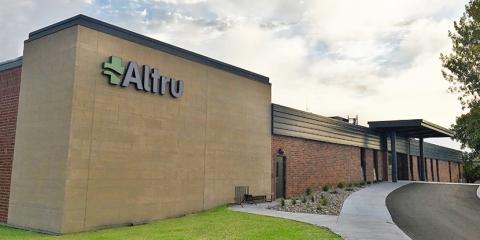Physical therapists at Altru work with patients to help them overcome disabilities caused by accidents, illnesses or chronic conditions. With locations in Grand Forks, East Grand Forks and other areas throughout the region, our physical therapists offer acute care and rehabilitation services for patients of all ages and diagnoses.
Conditions Physical Therapy Can Help
Physical therapy can be used to help treat or manage many conditions, including:
- Arthritis
- Cerebral palsy
- Chronic pain, including back and neck pain
- Down syndrome or other genetic disorders
- Injuries
- Joint or limb surgery, including amputations
- Multiple sclerosis
- Spinal cord injuries
- Stroke
Read More: 12 Things You May Not Know a Physical Therapist Treats
Goals of Physical Therapy
Physical therapists use modalities, such as ultrasound and electrical stimulation, as well as other interventions like manual therapy and exercise to work with patients and treat a variety of medical conditions, illnesses and injuries.
A physical therapist may specialize in treating specific areas, such as the back, neck, knee or shoulder. Some physical therapists focus on spinal cord injuries, amputations or other conditions.
Physical therapy is designed to:
- Improve balance, coordination and walking
- Increase muscle strength, flexibility and endurance
- Restore ability to safely complete daily living tasks
- Restore or improve range of motion
- Decrease pain
- Decrease swelling
- Correct deformities
- Prevent injury
Physical Therapy Services
Physical therapists at Altru provide the following programs and services:
- Amputee rehabilitation—If you need to relearn how to do daily tasks after limb loss or learn how to use an artificial limb, physical therapy can help you adjust to a new range of motion. Depending on the type of amputation and/or artificial limb you receive, this may include gait training (learning to walk again) or other activities.
- Ankle and foot rehabilitation—This type of physical therapy may be recommended after surgery or injury, or to combat arthritis or other joint disease. Ankle and foot rehabilitation will likely include exercises to help improve or maintain strength and flexibility.
- Orthopedic rehabilitation—This form of therapy may be used after an orthopedic surgery or injury.
- Neuro rehabilitation—This form of therapy may be used to help patients recover from stroke, traumatic brain injury or other brain disorders.
- Lower extremity rehabilitation—This form of rehabilitation may be recommended after an illness or injury that affects pain, function and range of motion of the leg.
- Spine care—This form of physical therapy will help to strengthen the muscles surrounding your spine, which can help alleviate back pain or prevent injury.
- Upper extremity rehab (shoulder)—This form of therapy will help improve range of motion, function and pain level in your shoulder.
- Instrument assisted soft tissue mobilization (IASTM)—IASTM is a popular method of treating soft tissue dysfunctions and injuries. This intervention is commonly known by the brand of the technique and tool, such as Graston® technique or Astym® therapy.
- Pediatric physical therapy—Altru’s physical therapy offers diagnostic and educational services for children with genetic, neurological or orthopedic disorders.
- Pelvic pain dysfunction and bladder control issues—This can be treated with the use of biofeedback, pelvic muscle strengthening and control, or methods of pain relief including ultrasound.
- Posture and body mechanics—This form of therapy can help you walk, stand, sit and move with mindfulness, maintaining proper alignment and minimizing joint, bone or muscle pain.
- Prenatal and postnatal care—Altru’s Family Birthing Center offers information on childbirth, breastfeeding, infant massage and other forms of care for each member of the family. Our physical therapists are part of a team that provides postnatal care for the new mom in a group class or individual therapy sessions. Learn more about the prenatal and postnatal care Altru has to offer.
What to Expect
Referral
Physical therapy can take direct referrals from patients without a provider’s order if the patient’s insurance company allows it. Our staff work closely with referring and/or primary physicians regarding treatment plans, goals and progress.
Evaluation
During your initial visit, your physical therapist will evaluate your condition. This involves reviewing your health history, determining how you could benefit from physical therapy, outlining treatment goals and developing a treatment plan.
Progress
The quality and speed of your recovery depends largely on you. The time and effort you invest in your therapy program will help you enjoy the best possible outcome.
During each visit, your physical therapist may teach you how to perform certain exercises or how to use equipment or devices for assistance, such as canes or walkers. They may teach you about other methods of treatment or management, and how to perform these methods for yourself at home. Some interventions need to be performed by your therapist and only happen at your session. What you and your therapist cover during your session will vary depending on your needs and goals. Regardless of why you receive physical therapy, the goal is to give you tools that you can use to manage your concerns and help you lead the quality of life you desire.
Your physical therapist will maintain a careful record of your progress and periodically re-evaluate your condition. You are encouraged to ask questions and openly discuss problems.
Schedule an appointment or find an Altru physical therapy location close to you.
Locations
North Dakota:
- Altru Performance Center | 701.780.2300
- Altru Clinic | Devils Lake 701.665.5247
- Altru Clinic | Drayton 701.454.3311
- Altru Family YMCA | Grand Forks 701.780.2400
- Hatton Prairie Village | Hatton 701.780.2400
- Larimore Masonic Temple | Larimore 701.780.2400
- Nelson County Health System | McVille 701.780.2400
- Pembilier Nursing Center | Walhalla 701.780.2400
Minnesota:
- Altru Clinic | Crookston 218.281.9100
- Altru Clinic | East Grand Forks 218.773.0357
- Altru Clinic | Erskine 218.687.5317
- Altru Clinic | Thief River Falls 218.681.7280
- Kittson Memorial Clinic | Karlstad 218.436.7614 or 701.780.2400 for scheduling












